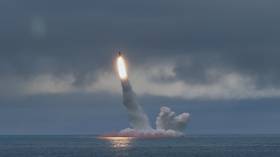Russia wants to extend 'New START' nuclear arms control deal but not at any cost – deputy foreign minister

Moscow wishes to prolong the New START Treaty but not if the US demands unreasonable concessions, Deputy Foreign Minister Sergey Ryabkov has said, adding that the Russian and American positions on the issue remain quite different.
Russia is ready to extend the treaty without any preconditions BUT Washington is still hesitating in agreeing to that, Ryabkov said following another round of nuclear arms talks with the US Special Presidential Envoy for Arms Control Marshall Billingslea in Vienna.
Also on rt.com ‘They want to win’: NUCLEAR confrontation becomes likelier as US races for global domination, Russian FM saysThe high-ranking diplomat hailed some progress in the negotiations by saying that both sides took a more constructive stance and stuck to “intensive, in-depth and business-like discussions,” according to Russia’s permanent representative to international organizations in Vienna, Mikhail Ulyanov.
Yet, Moscow and Washington’s priorities in the talks appear to still “differ significantly,” Ryabkov noted. He said that the US continues to leave the door for talks open but he cannot say that its position has changed in favor of extending the accord.
“They [the US] evade an answer … to the question whether they are ready to prolong the treaty without preconditions,” Ryabkov told journalists, adding that Washington is still very much interested in making China join the talks on strategic stability. Russia, in turn, would very much like the UK and France – US allies and nuclear powers themselves – to sit down at the negotiating table as well.
Also on rt.com US ‘working on nuclear non-proliferation agreement with Russia,’ Trump says after discussing New START with PutinBillingslea meanwhile told journalists that Washington has informed Moscow about its terms in extending the treaty that expires in February. The US said it would consider prolonging it if Russia’s “build-up” of shorter-range nuclear missiles not covered by the current agreement is addressed.
“Russia understands our position. And what remains to be seen is if there is the political will in Moscow to get this deal done. The ball is now in Russia's court,” the US official said.The issue of short-range nuclear ballistic missiles was covered by another treaty – the INF – signed by Washington and Moscow back in the 1980s. The accord effectively banned such ground-based missiles altogether. Yet, the Trump administration unilaterally left it in 2019, citing the same alleged Russian build-up, only to later test their own ground-based cruise missile just after the agreement expired.
Moscow’s attempts to save the deal by even allowing the US military inspectors to see the missile they said violated the treaty for themselves were effectively snubbed by the US.
Also on rt.com Russia unveils evidence on missile that US claims violates INF Treaty, Washington snubs briefingThe New START Treaty, which remains the only standing pillar of international nuclear arms control after the expiration of the INF due to America’s exit, came into force in 2011. It limits the number of deployed intercontinental ballistic missiles (ICBMs), submarine-launched ballistic missiles (SLBMs) and strategic bombers, of which the US and Russia can have up to 700 each. The number of deployed warheads was capped at 1,550, while the countries pledged to maintain no more than 800 deployed and non-deployed launchers.
The fate of the crucial agreement has been in limbo for a year and a half since no talks were held on its extension despite the nearing expiration date. Hopes resurfaced back in June when Moscow and Washington agreed to hold arms control consultations in Vienna. Yet, according to Ryabkov, the dates of new consultations have not yet been set following the Tuesday meeting since both sides still want to analyze each other’s positions.
Think your friends would be interested? Share this story!













